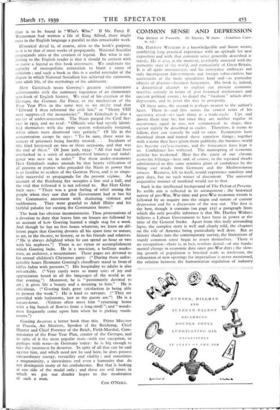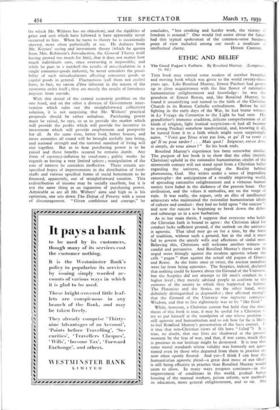COMMON SENSE AND DEPRESSION
lire Deteat at Poverty By Hartley W thers. (Jonathan Cape. 7s. 6d.) Mn. HARTLEY WITHERS is a knowledgeable and fluent writer, combining long practical experience with an aptitude for neat exposition and with that common sense generally described w sturdy. He is also, at the moment, justifiably annoyed with the economic state of the world, and particularly of Great Britain. It is all quite unnecessary; and his annoyance embraces not only incompetent Governments and foreign sabre-rattlers but economists of the more speculative kind and—as particular objects of distaste—business forecasters. His book is, indeed, a determined attempt to explain our present economic troubles entirely in terms of past historical misfortunes and current political events ; to dispel the " fatalism " which abets depression, and to point the way to prosperity.
Of these aims, the second is perhaps nearest to the author's heart. There is—and this seems the central tenet of his economic creed—no such thing as a trade-cycle. Ups and downs there may be; but since they are neither regular in occurrence, equal in size, nor symmetrical in shape, they cannot rightly be described as cycles. Therefore, it seems to follow, they can scarcely be said to exist. Economists have theorised about and named these nameless things ; together with a name they have given them publicity, the business world has become cycle-conscious, and the forecasters have kept it so. Confidence has withered. The mainspring of economic activity has weakened. Here lies the cause of our chronic economic lethargy—here and, of course, in the repeated shocks administered to this same sensitive plant of confidence by the biting east winds from Germany and the Mediterranean sirocco. Business, left to itself, would experience sunshine and grey days, but no such winter of discontent. The universal acquisitive instinct of mankind would see to that.
Such is the intellectual background of The Defeat of Poverty. Its treble aim is reflected in its arrangement ; the historical survey of pre-War, War-time and post-War economic events is followed by an inquiry into the origin and nature of current depression and by a discussion of the way out. The first is the best, though it contains (on page 155) a paragraph from which the only possible inference is that Mr. Hartley Withers believes a Labour Government to have been in power at the time of the General Strike. Apart from this truly astounding lapse, the complex story is well and clearly told, the chapters on the role of America being particularly well done. But as history shades into the contemporary survey, the limitations of sturdy common sense begin to assert themselves. There is no recognition—there is, in fact, resolute denial—of any funda- mental change in economic data since pre-War days ; the slow- ing growth of population is brushed aside as irrelevant, the exhaustion of new openings for imperialism is never mentioned, the relation between the humanitarian regulation of industry
(to which Mr. Withers has no objection), and the rigidities of price and cost which have followed it have apparently never occurred to him. When he turns to theory he is occasionally shrewd, more often pathetically at sea. He deduces from Mr. Keynes' saving and investment theory (which he quotes from Mrs. Robinson's Introduction, the General Theory itself having proved too much for him), that it does not matter how much individuals save, since oversaving is impossible; and while he puts in a nutshell the results of miscalculation in a single consumer-goods industry, he never considers the possi- bility of such miscalculations affecting consumer goods or capital goods in general. Fluctuations (call them not cycles) have, in fact, no raison d'être inherent in the nature of the economic order itself ; they are merely the results of fortuitous impacts from outside.
With this denial of the central economic problem on the one hand, and on the other a distrust of Government inter- vention which rules out the straightforward collectivist solution, it is not surprising that Mr. Withers' practical proposals should be rather nebulous. Purchasing power must be raised, he says, so as to provide the market which will provide the profits which will provide the incentive to investment which will provide employment and prosperity for all. At the same time, better food, better houses, and more amenities all round will be brought usefully into being, and national strength and the national standard of living will rise together. But as to how purchasing power is to be raised and these benefits secured he remains dumb. Any form of currency-inflation he condemns ; public works he regards as having a very limited sphere ; manipulation of the rate of interest he considers ineffective. There remain un- specified hopes of improvements in the distribution of food- stuffs and various specified forms of social betterment to be financed, apparently, out of straightforward taxation. This redistribution of income may be socially excellent, but it is not the same thing as an expansion of purchasing power. Admirable as are all Mr. Withers' aims and high as is his optimism, one sets down The Defeat of Poverty with a sense of discouragement. " Given confidence and courage," he
concludes, " less croaking and harder work, the victory of freedom is assured." One would feel easier about the future had this typical spokesman of the common-sense business point of view included among our needs a modicum of











































 Previous page
Previous page